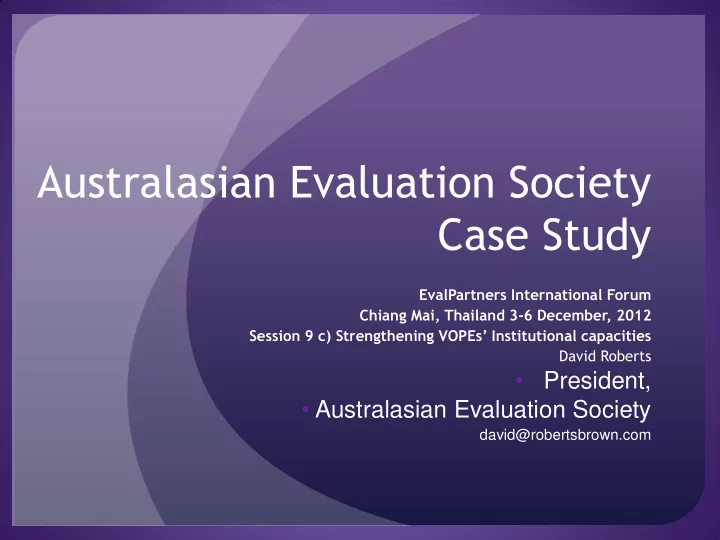

Australasian Evaluation Society Case Study EvalPartners International Forum Chiang Mai, Thailand 3-6 December, 2012 Session 9 c) Strengthening VOPEs’ Institutional capacities David Roberts • President, • Australasian Evaluation Society david@robertsbrown.com
Introduction AES Case Study Details in the Paper Highlight some key points Discuss examples
Background
History of the AES New Zealand & Australia Established 1987 a learned society. Dr Elaine Martin Founding Fellows Dr Anona Armstrong Dr John Owen. Sue Funnell Chris Milne Professor Colin Sharp Ian Trotman
Objectives establishing and promoting ethics and standards in evaluation practice as a service to the community of evaluators and users of evaluations; encouraging advances in the theory and practice of evaluation by publishing such advances and by recognising outstanding contributions; providing education and training in matters related to evaluation; providing forums for networking and the discussion of ideas including society publications, seminars, workshops and conferences; acting as an advocate for evaluation and encouraging understanding about the use and application of evaluation; linking members who have similar evaluation interests; and other activities consistent with this aim.
Membership 1000 members 38% public sector 36% consultants 12% Not-for-profit sector 12% Academics
CYCLES Case study shows cycles in AES All organizations - cycles of growth and renewal Environment also cycles and affects internal dynamics
Environment 2 National Governments NZEA 8 States and Territories My experience largely with Australian Federal Government
Australian Government Changes Late 1980s – Golden Age Portfolio Evaluation Plans Evaluations published 1998 Output – Outcomes Framework Shift to monitoring Big policy review Intermittent efforts to increase evaluation Not meeting needs of Cabinet
Current Some Departments strong Tune Talks the Talk – we’ll see Focus on Budget Surplus and cutting expenditure Federal and 4 States National monitoring processes
Evolution of the AES Structure and Operations
Early Days 1982-1992: Executive Committee comprising three office bearers and a general membership In 1992, a corporate plan “AES 2000: Leading the Society into the Future. AES as a broker between “doers” and “supporters” of evaluation part time staff to improve services
Incorporation 1993 incorporated Capital Territory Association Incorporated Act Board of 4office bearers, regional representatives 5 elected general members
1995 New Strategic Plan “AES Leading Evaluation Theory, Practice and Use into the 21st Century.” A centralised financing model was established A few regions were partially funded through other organisations or by sponsors
Internal v External Up till 2009 largely inward focus Even case study talks about what we did Previous Board started turnaround
Restructure 2009 New AES Constitution 8 Member Board Suite of Committees e.g. Membership Services and Governance Conference Organising Finance and Audit
STRATEGY AND IMPLEMENTATION
Strengthening an Enabling Environment AES Guidelines for the Ethical Conduct of Evaluations (1997) AES Code of Ethics (2000) Policy Advocacy – e.g. submission to Commonwealth Financial Accountability Review International support e.g. PNG - Association of Professional Evaluators (AoPE)
Strategy and Plans AES Ten Year Strategy 2010-2020 Vision: “To be the pre -eminent voice and leader of evaluation in Australasia” Mission: “To see rigorous evaluation as central to policy development, program design and service delivery.” Operational Plan for 2011-2013.
Regional Activity Two Countries 10 Regions Volunteer Run Local program seminars and discussion forums Book club Social events Conference Organising committee
Special Interest Groups Indigenous Evaluation Eval-Tech Performance measurement Realist Evaluation and synthesis
Annual International Conferences 1982 - Melbourne (before AES) Links between New Zealand and Australian professionals 1986 - Sydney. Annually on rotation since 350-400 participants AGM Awards Presentation
Evaluation Journal of Australasia 1987-88 The Bulletin of the AES 1989 changed its name to Evaluation Journal of Australasia (EJA) New series commenced 2001 Refereed articles Expanding the market reach
Other Publications 1977-84 an evaluation newsletter edited by Jerome Winston. In 1992 - Evaluation News & Comments On-line E - News
Indigenous Evaluation Priority for the AES. increasing the numbers of Indigenous people in evaluation; strengthening the capacity of evaluators to produce high quality, ethical work in Indigenous contexts; increasing knowledge, skills and competence of Indigenous and non- Indigenous evaluators.
Key initiatives Conference support grants registry of Indigenous researchers exploring mentoring/training pathways an promoting partnerships
Impacts Big changes lots of implementation challenges Environment challenges Membership decreased Operating Losses Plan to turn it round
BOTTLENECKS/CHALLENGES Building financial momentum and governance capacity Conferences major source of revenue Sometimes lost $ Appointed EO in 2011 Dispersed geographical spread of operations Building an online presence www.aes.asn.au 1996 website hosted by the supplier of AES administration services at no cost. New Website this year
KEY ENABLING FACTORS Vision and Leadership Fellows Boards Committees Professional Practice and Ethics Building critical mass Sound governance principles and practice
Strategic Partnerships FaHCSIA & AusAID Families, Housing, Community Services and Indigenous Affairs Supporting Good evaluation practice Sponsored conferences Aim to Develop Partnerships
INNOVATIONS AND LESSONS LEARNED Continuous improvement change and experimentation Building Credibility Governance processes Business model
NEXT STEPS Refine structures and processes Implement Strategic Plan Improve member services Increase advocacy for evaluation Strengthen communication Review
Recommend
More recommend